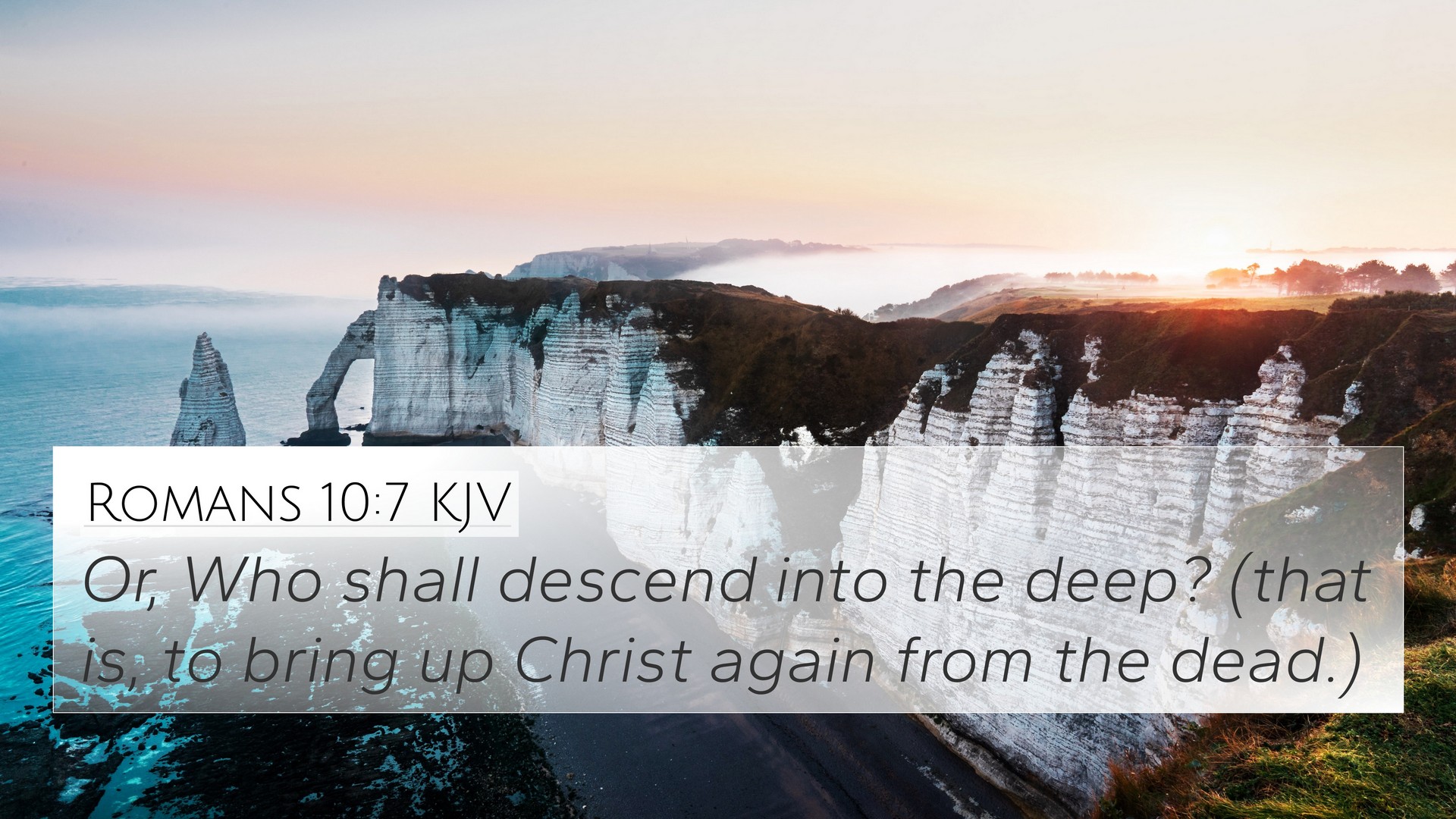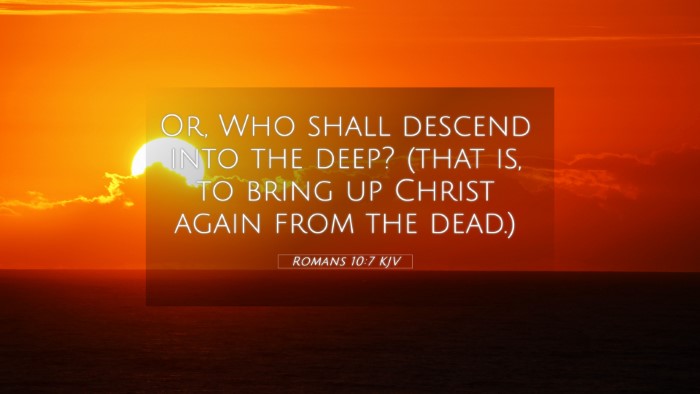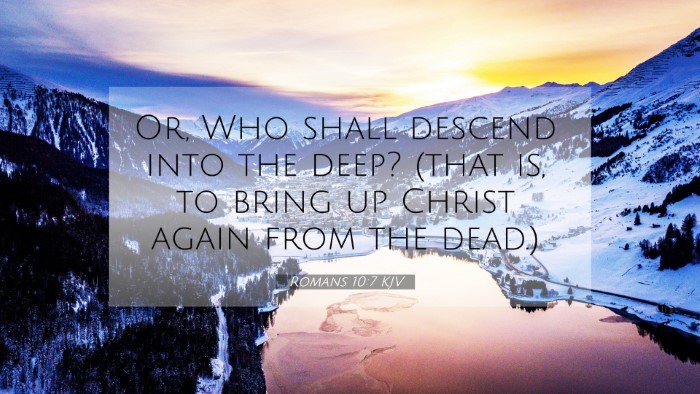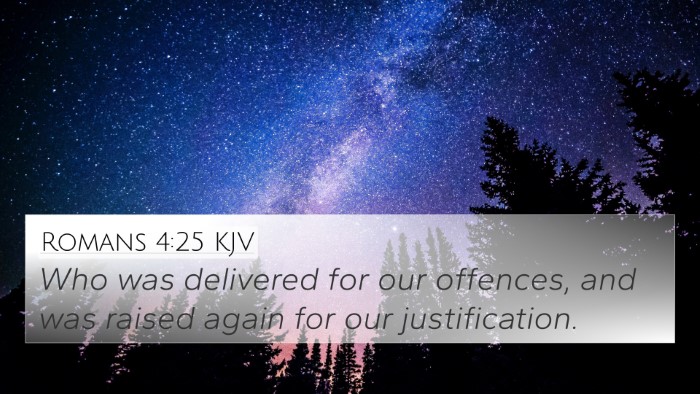Old Testament
Genesis Exodus Leviticus Numbers Deuteronomy Joshua Judges Ruth 1 Samuel 2 Samuel 1 Kings 2 Kings 1 Chronicles 2 Chronicles Ezra Nehemiah Esther Job Psalms Proverbs Ecclesiastes Song of Solomon Isaiah Jeremiah Lamentations Ezekiel Daniel Hosea Joel Amos Obadiah Jonah Micah Nahum Habakkuk Zephaniah Haggai Zechariah MalachiRomans 10:7 Similar Verses
Romans 10:7 Cross References
Or, Who shall descend into the deep? (that is, to bring up Christ again from the dead.)
Uncover the Rich Themes and Topics of This Bible Verse
Listed below are the Bible themes associated with Romans 10:7. We invite you to explore each theme to gain deeper insights into the Scriptures.
Romans 10:7 Cross Reference Verses
This section features a detailed cross-reference designed to enrich your understanding of the Scriptures. Below, you will find carefully selected verses that echo the themes and teachings related to Romans 10:7 KJV. Click on any image to explore detailed analyses of related Bible verses and uncover deeper theological insights.
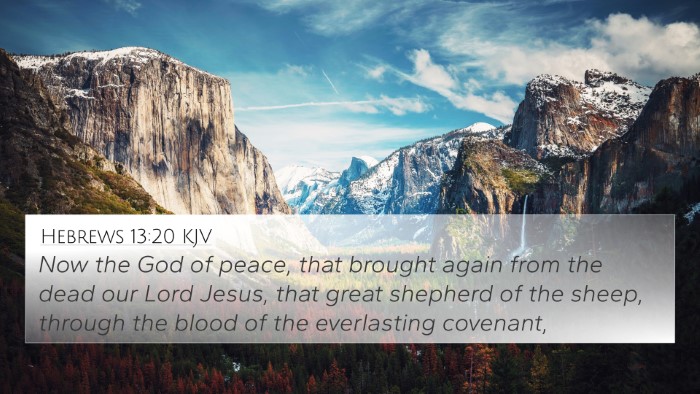
Hebrews 13:20 (KJV) »
Now the God of peace, that brought again from the dead our Lord Jesus, that great shepherd of the sheep, through the blood of the everlasting covenant,
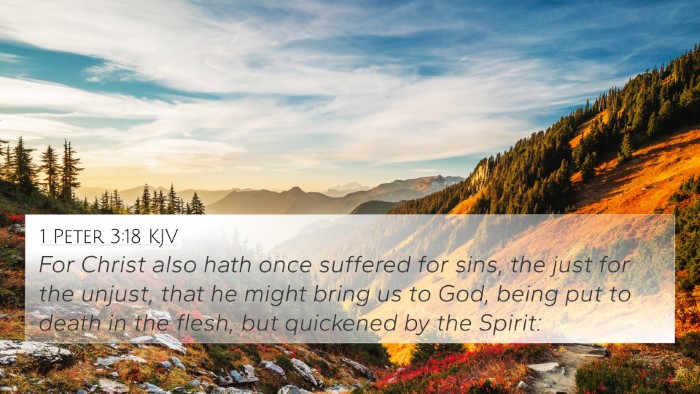
1 Peter 3:18 (KJV) »
For Christ also hath once suffered for sins, the just for the unjust, that he might bring us to God, being put to death in the flesh, but quickened by the Spirit:

1 Peter 3:22 (KJV) »
Who is gone into heaven, and is on the right hand of God; angels and authorities and powers being made subject unto him.
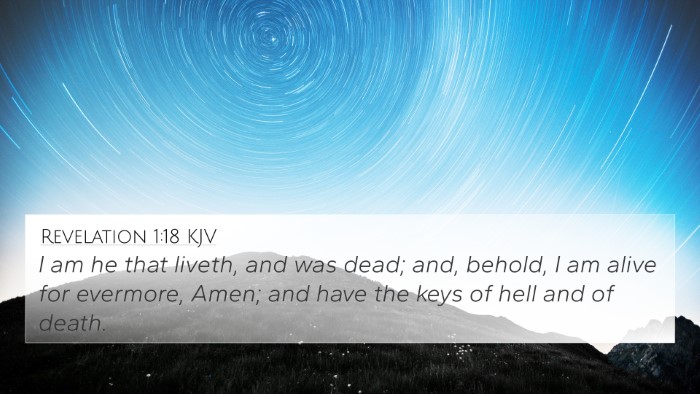
Revelation 1:18 (KJV) »
I am he that liveth, and was dead; and, behold, I am alive for evermore, Amen; and have the keys of hell and of death.
Romans 10:7 Verse Analysis and Similar Verses
Understanding Romans 10:7
Romans 10:7 states: “Or, Who shall descend into the deep? (that is, to bring up Christ again from the dead).” This verse forms a part of Paul’s discussion on the righteousness which is by faith, contrasting it with the righteousness which is based on the law. The inquiries in this verse contribute to the overall theme of God’s redemptive work through Christ.
Commentary Insights
Matthew Henry notes that this question, “Who shall descend into the deep?” illustrates the mystery and the unfathomable depths of God’s salvation. It implies that one cannot reach such depths by their own merit. It emphasizes reliance on Christ for salvation rather than human effort.
Albert Barnes comments that Paul uses rhetorical questions to illustrate the futility of trying to attain righteousness through human efforts. The "deep" represents a place of despair and separation from God. The passage highlights that the resurrection of Christ is an act of God’s grace and power, emphasizing that God has done what humanity could not.
Adam Clarke elaborates on the meaning by explaining that descending to the deep symbolically refers to the grave or hell. This mirrors the thoughts of the prophets and points towards the need for Christ’s resurrection in the complete plan of salvation. It serves as a reminder of the absolute importance of Christ’s victory over sin and death, thereby fulfilling the law.
Bible Cross-References
- Deuteronomy 30:12-14 - “It is not in heaven…” indicates accessibility of God's word.
- John 3:13 - “No one has ascended to heaven…” refers to Christ’s authority and resurrection.
- Ephesians 4:9 - Discusses Christ descending into the lower parts of the earth.
- 1 Corinthians 15:20 - Affirms Christ as the first fruits of those who have fallen asleep.
- Philippians 2:10-11 - “Every knee should bow…” speaks to Christ's lordship over death.
- Acts 2:27 - Quotes a prophetic assurance regarding the resurrection.
- Romans 8:34 - “Who is he that condemneth? It is Christ that died…” emphasizes Christ's role in our justification.
- Hebrews 2:14-15 - Explores Christ’s victory over death and the devil.
- Revelation 1:18 - “I am he that liveth, and was dead…” confirms the resurrection of Christ.
Thematic Connections
These cross-references support the comprehensive understanding of the doctrines of resurrection, salvation, and the efficacy of Christ's sacrifice. The connections between these verses emphasize salvation's accessibility, the necessity of faith, and reinforce the core Pauline theology that faith supersedes the law.
Applications in Bible Study
Using a bible concordance or a bible cross-reference guide can significantly enhance your study of Romans 10:7. These tools allow for effective exploration of cross-referencing Bible study methods, facilitating understanding of inter-Biblical dialogue where similar themes arise.
For a deeper insight into bible verse parallels, a detailed comparative study of Pauline epistles should be undertaken, looking into how Paul's other writings echo these themes of salvation and faith. This enriches one’s understanding of connections between the Old and New Testament and the broader narrative of redemption.
Conclusion
In conclusion, Romans 10:7 encapsulates profound theological truths about the nature of salvation and resurrection, underscoring the idea that true righteousness and hope lie not within human endeavor, but through faith in Christ’s completed work. The use of scriptural cross-referencing to study this verse can illuminate the interconnectedness of scripture and deepen one’s understanding of the biblical narrative.
